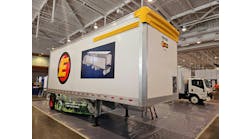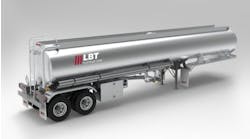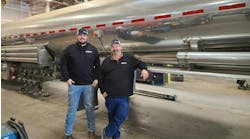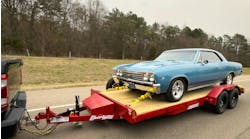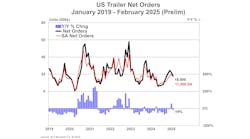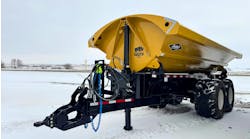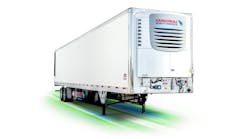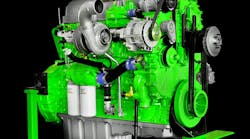As expected, the California Air Resources Board (CARB) has approved greenhouse gas regulations for medium- and heavy-duty vehicles that largely align with federal Phase 2 GHG/fuel efficiency targets. Truck and engine makers, along with trucking industry representatives, supported the initiative and cited the need for uniform national standards.
Should the Trump administration follow through on plans to reconsider the Phase 2 standards for trailers and gliders, California still would press ahead with its own model year 2020 implementation date—and could expand the scope of the rule—CARB staff during the Feb. 8 hearing.
Additionally, the unanimous passage of the California Phase 2 GHG standards and proposed amendments to the current Tractor-Trailer GHG regulation opens the door for other states to follow with rules of their own.
Mentioned but not discussed, however, was the possible need for a federal waiver under the Clean Air Act to enact the new standards—a privilege unique to California, and an important tool in the state’s implementation of aggressive environmental programs. But, in the ongoing effort to roll back fuel efficiency for cars and trucks, current EPA Administrator Scott Pruitt has hinted that if California is unwilling to negotiate, waiver requests could be blocked.
In presenting the proposal, CARB representatives emphasized that the state agency had worked closely with the Obama administration’s EPA and NHSTA in developing the federal rule, in anticipation of “harmonizing” the state requirements. But the CARB staff is “very concerned” about Pruitt’s promise to reconsider the trailer and glider provisions, with CARB’s Mitzi Magtoto calling such a review “unfounded and arguably illegal.”
“The stay of the trailer requirement does not affect California’s authority to establish standards for trailers,” Magtoto said. “Whether the EPA rescinds to the Phase 2 trailer requirements or not, CARB plans on implementing the California Phase 2 trailer certification requirements and the modified TTGHG rule.”
Among the significant differences in the state rule, truck, engine, and trailer manufacturers must certify separately in California, meaning the new rule drops the current “deemed to comply” allowance for EPA certification. However, CARB is working on an expedited certification option that could streamline upfront certification in exchange for in-use data.
Magtoto also noted approval of the regulation “sets stage for future actions” to meet GHG reduction goals.
Indeed, to make up the potential “loss in benefits” from the rule due to uncertified trailers coming from out-of-state, CARB next year expects to expand the applicability and increase the stringency of the fleet-focused TTGHG rule for any carriers that travel in California.
In a joint comment filed ahead of the hearing, the American Trucking Associations and the California Trucking Association expressed support for the proposal.
“Given the interstate nature of trucking, national consistency in regulatory approaches is critical. It is both unwise and unhealthy for the nation’s economy and the movement of the nation’s freight to have a patchwork of state and federal tailpipe and fuel consumption standards for trucks,” the filing said.
But in testimony during the hearing, ATA Director of Environmental Affairs Mike Tunnell expressed concern about “California-only” provisions and the rising cost of new tractors and trailers, and how these costs are impacting fleet modernization in the state. Likewise, tenactment of additional regulatory requirements and enforcement disparities are impacting the economic viability of the state’s trucking industry.
The Phase 2 rule adds about $12,000 to the cost of a tractor and more than $1,000 to the cost of a trailer, he noted.
“We want to make sure the actions of this board serve to incentivize fleet modernization, rather than inadvertently promoting the purchase of and use of older equipment,” Tunnell said.
In board discussion, member Daniel Sperling noted anecdotally the widespread adoption of trailer aerodynamic devices that he's seen in travels around the country—but that the market penetration of such devices is still far from universal, at only about 30%, based on his observations.
“Is it really working the way I think it is? If it’s such a good idea, a lot of these companies should be doing it,” Sperling said. “We claimed that they were going to get a return within a year and a half. If that’s true, any smart company would be investing.”
He called on the CARB staff to come up with a survey of the effectiveness and adoption of such technologies.
“If we’re going to go down this path, we need to have a little more data—a little more information—to make sure it is as good an idea as it seems to us.”
Trailer industry representatives are monitoring the EPA reconsideration of the federal Phase 2 as well as the new California version.
"The NTDA is aware that CARB is moving forward with the EPA Greenhouse Gas Phase 2 Rules," said Gwendolyn Brown, president of the National Trailer Dealers Association. "The association will provide additional information to its members regarding this development in California and relative interstate commerce."
NTDA plans to include a presentation regarding the new CARB ruling at its Annual Convention, Oct. 3-5, at The Broadmoor in Colorado Springs, CO, Brown added.
